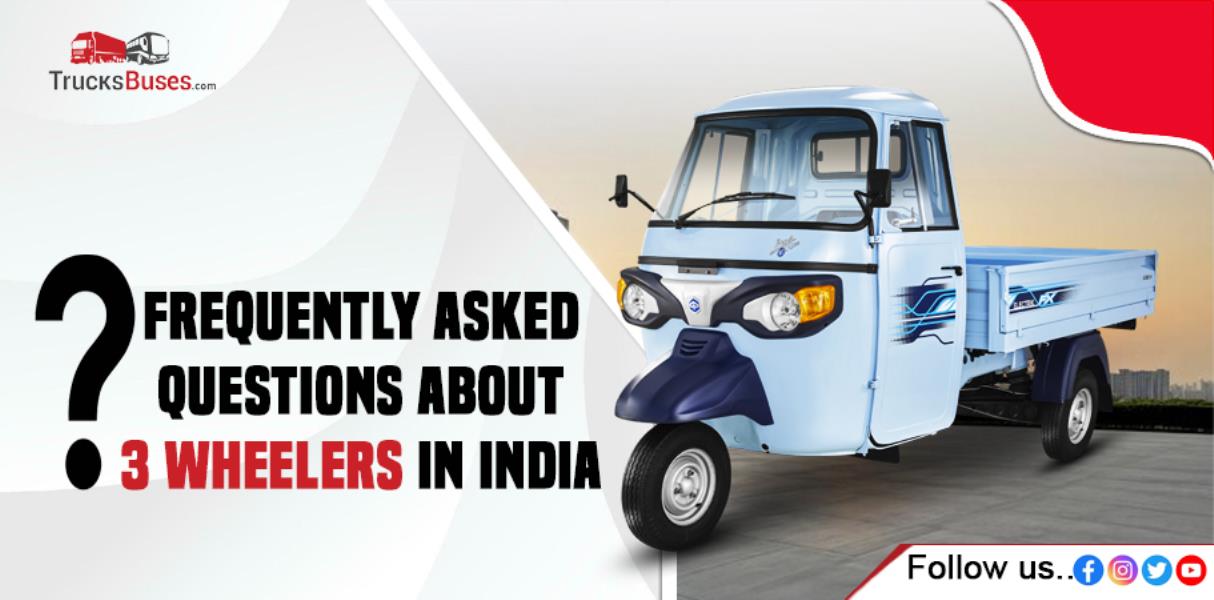Frequently Asked Questions About 3 Wheelers in India
In India, auto rickshaws and tuk-tuks are an essential part of the transportation system. These three-wheeled vehicles are popular for their affordability, ability to navigate narrow streets, and ease of turning in traffic. As of 2024, three-wheelers account for about 32% of the total vehicle market.
Randomly Asked Questions Related to Popular 3 Wheeler Brands in India

They come in various fuel types, including diesel, petrol, CNG, LPG, and even electric. Here, we will answer some frequently asked questions about three-wheelers in India.
1. Which are India’s Top 3 Wheeler Brands?
The top three-wheeler brands in India include Bajaj Auto, Piaggio vehicles, and Mahindra electric. These companies are known for their reliable and innovative vehicles. They also have extensive service networks across the country, making it easier for customers to get support and maintenance.
2. What is the Three Wheeler Price Range in India?
The price of three-wheelers in India varies widely. It ranges from approximately ₹0.58 lakh to ₹5.60 lakh (ex-showroom). This variation is due to different models, engine types, features, and fuel options. Buyers can choose from various configurations, such as passenger carriers, goods carriers, and electric versions.
3. Which is the Most Affordable Three-Wheeler Model in India?
The most affordable three-wheeler in India is the SN Solar Energy new passenger electric rickshaw. This electric model is quite popular, with a price range between ₹0.88 lakh. Its low cost makes it an attractive option for many buyers.
4. Which is the Most Expensive Three-Wheeler Model in India?
The title of the most expensive three-wheeler model goes to the OSM Vicktor electric rickshaw. Its price ranges from ₹5.00 lakh to ₹5.60 lakh. This high-end model offers advanced features and is designed for those looking for premium quality.
5. How Fuel-Efficient Are Three-Wheelers Across India?
Three-wheelers in India are generally fuel-efficient, with mileage ranging between 20 to 35 kilometres per litre. The actual mileage depends on the model and engine type. Diesel and CNG versions tend to be more economical than petrol models, making them popular choices for daily use.
6. Do Three-Wheelers Require a License to Drive?
Yes, driving a three-wheeler requires a valid driving license. Specifically, drivers need a three-wheeler license to ensure they meet safety and operational standards. This licensing process typically includes training and testing to verify the driver’s capability to operate the vehicle safely on public roads.
7. What Are Some Advantages of Three-Wheelers in India?
Three-wheelers offer several advantages as a mode of transportation. They are economical, fuel-efficient, and easy to drive, especially in crowded areas. Their compact size makes them ideal for short trips and navigating narrow streets. They can also serve dual purposes, transporting passengers and goods, making them affordable for many small business owners.
8. What is the Load Carrying Capacity of Commercial Three-Wheelers in India?
The load-carrying capacity of commercial three-wheelers in India typically ranges from 350 kg to 1,000 kg. This capacity can vary by model and manufacturer. Business owners often use these vehicles for transporting goods and local deliveries, including small-scale logistics.
9. How is the Three-Wheeler Market Expected to Grow in India?
The three-wheeler market in India is expected to grow significantly due to increasing urbanization. There is a rising demand for low-cost transportation, along with government incentives for electric vehicles. The shift towards electric three-wheelers, driven by environmental concerns and supportive policies, will also contribute to this market growth.
10. What Are the Various Types of Three-Wheelers Available in India?
There are different types of three-wheelers in India, including passenger autos, freight carriers, and electric variants. Passenger autos are designed to carry people, while freight carriers are used for transporting goods. Electric three-wheelers provide an eco-friendly alternative and cater to various needs, from urban transport to commercial use.
11. Are Three-Wheelers Good for Business in India?
Yes, three-wheelers are excellent for business in India. Their affordability and versatility make them suitable for various commercial purposes, such as delivering goods or providing transport services. Due to their low operating costs, they are a popular choice for many small business owners and entrepreneurs.
12. What Could Be the Maintenance Cost of Running a Three-Wheeler?
The maintenance cost of running a three-wheeler includes regular servicing, battery replacements, and minor repairs. On average, monthly maintenance expenses can range from ₹1,000 to ₹2,000. Battery replacements, needed every six months to a year, can cost between ₹10,000 and ₹20,000, depending on the model.
Discover Your Perfect Three-Wheeler: How TrucksBuses.com Can Guide You
Looking for the perfect three-wheeler? TrucksBuses.com can help you find the right one for your needs. With a wide range of options available, you can compare different models, prices, and features all in one place. Whether you need a vehicle for personal use or business, our website makes the search easy and efficient. You can read detailed reviews and get valuable information about fuel efficiency and maintenance costs. TrucksBuses.com is your trusted partner in making an informed decision.
Conclusion
Three-wheelers are compact, affordable, and have low operating costs, making them an ideal choice for transportation in India. With the growth of electric three-wheelers and government incentives, the market for these vehicles is expected to expand. Leading brands like Bajaj and Piaggio continue to innovate, offering reliable models at economical prices. Whether for personal use or business purposes, three-wheelers are here to stay in India’s bustling transport landscape.
Related Blog:
Top 5 Loading Auto in India
Electric 3 Wheelers: The Future of Auto Rickshaws